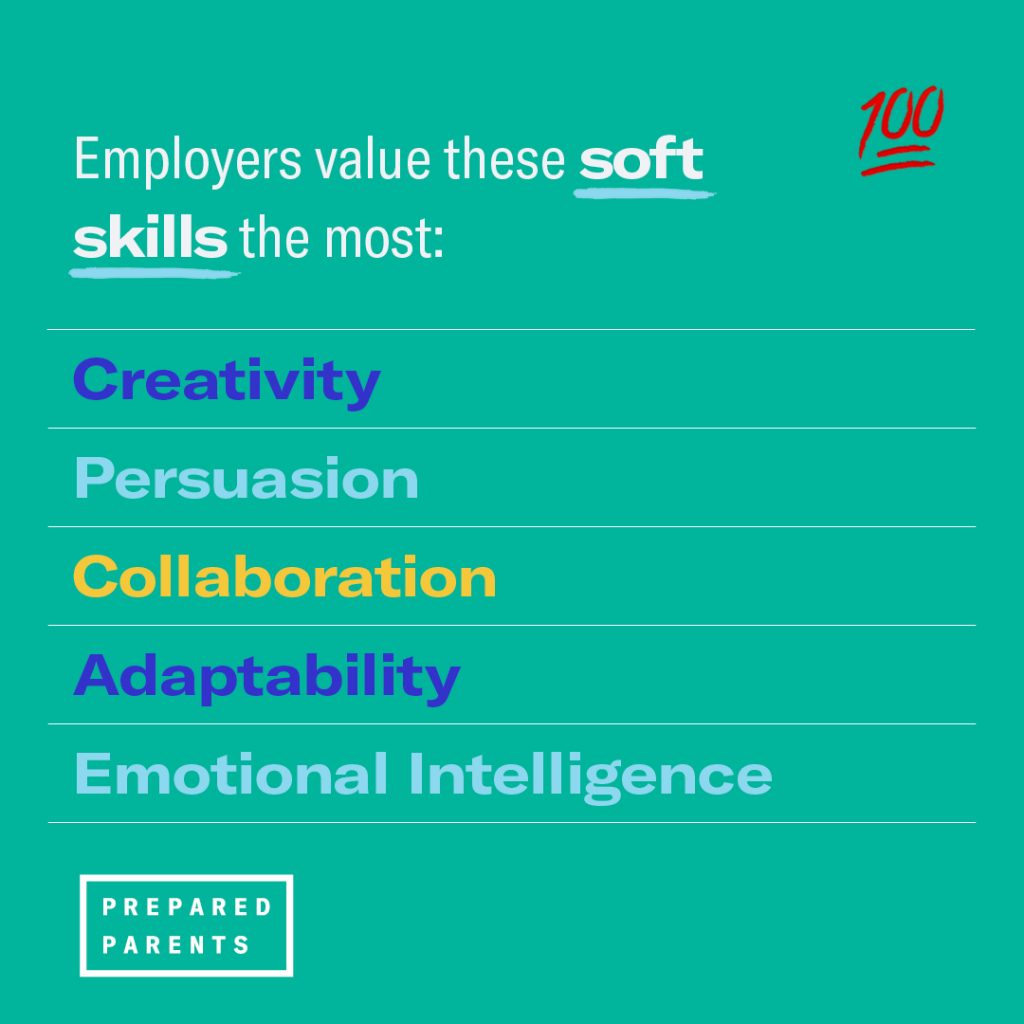As parents, when we think about collaboration, we often have images of our kids working on a group project. But today, collaboration is so much more rigorous and involves:
- connecting authentically with others;
- recognizing that people are different, and knowing how to work across differences;
- persuading (not demanding!) people to hear your thoughts, ideas and proposals;
- being sensitive to the emotions and thoughts of teammates; and
- putting team performance above individual success.
Collaboration is what drives action. And the root of being collaborative is being a team player.

Collaboration means working together across differences to accomplish a common goal. Great collaborators bring out the best in other people, inspire them, coordinate with them, and persuade them to buy into ideas.
When teams work well together it elevates each team member’s contribution and improves a project’s outcome. In the business world, collaboration gives companies a competitive edge. Teams outperform individual decision-makers 66% of the time. When collaborative work includes diverse teams that involve different ages, genders, and geographic locations, that percentage rises to 87%. But, since we tend to be a competitive culture, collaboration does not happen naturally. By teaching the skills of collaboration at home, you’re helping your kid develop a habit they’ll continue to build throughout their lives.
Year after year, reports published by the National Association of Colleges and Employers, the World Economic Forum, and LinkedIn, among others, describe a handful of Universal Skills that employers and colleges consistently rate as the most significant for future job candidates. These Universal Skills include adaptability, collaboration, communication, creativity, critical thinking, and problem-solving. While all these skills are invaluable to our kids’ success in school and in the future, they become even more powerful when they build on one another. The ability to tap into these skills will enable our kids to adapt in rapidly changing environments. And the one with the biggest payoff is collaboration.
Collaboration as a family happens all the time. You’re setting up group goals you want to accomplish together. Take advantage of these real-world opportunities to develop this important skill by focusing on these four things.
To collaborate, communicate
Effective collaboration depends on excellent communication. Articulating clear goals early and often will keep your family team on task. And giving each individual a voice and the opportunity to use it allows all family members to fully participate. But communication does not just mean letting team members talk; being a great communicator also means being a good, active listener.
How?
- Listen without interrupting or offering your opinion right away.
- Give adequate time for each person to express themselves.
- Set the expectation to be open-minded as you listen to each other.
- Use these sentence starters to show you were listening:
- I noticed…
- I wonder…
- Problem-solve as much as possible together with the kids.
Agree to agree, come to consensus
Make decisions by consensus. Why? It makes for effective collaboration.
- Consensus as a process forces people to learn how to bring an idea forward, develop a proposal, get buy-in, and see it through.
- If someone isn’t on board, it forces that individual to learn how to be constructive and work with others to make a proposal better or different.
Consensus doesn’t mean everyone will get their way—often no one will—and it doesn’t mean everyone will be happy. But, it does mean that everyone is part of the decision.
To reach consensus as a family, make a Decision Grid a household tool. While certain decisions will ultimately land with parents, kids can become part of the decision making process.
Download our sample Decision Grid to give it a try.
Take responsibility, be accountable
Teams that collaborate well check in frequently to share feedback, observations, encouragement, and suggestions. But each individual is responsible for their own role. It may feel counter-intuitive, but collaboration requires self-direction. A kid who is self-directed takes ownership for their role on the team, and the confidence developed through self-direction can propel other team members as they support each other.
Have your kid practice answering these questions when taking on a new collaboration:
- What do I care about?
- What do I know?
- What don’t I know?
- What are my strengths?
- What do I need to improve?
- What can I contribute to the team?
“Successful collaborators know their strengths and where they need to improve. They know what they contribute to their team because they know themselves: who they are, what they care about, what they know, and what they don’t know.”
— Diane Tavenner, CEO and co-founder of Summit Public Schools, author of Prepared: What Kids Need for a Fulfilled Life
Connect with each other, practice empathy
Empathy is how we make connections. It’s the foundation for acting ethically, building good relationships, loving well, and living successful lives. In the business world, empathy is considered one of the five essential personality traits of every leader.
Empathy is feeling with people. It builds trust, and if you trust those you collaborate with you won’t step on their toes as they fulfill their responsibilities. Practicing empathy resolves the desire to grab power and promotes engagement with the rest of the group.
“What really makes you a great team player is that you can be very sensitive to the emotions and thoughts of other people on your team and that you can put team performance above your own individual success.”
—Angela Duckworth
Professor of Psychology at the University of Pennsylvania & the co-founder and CEO of Character Lab


